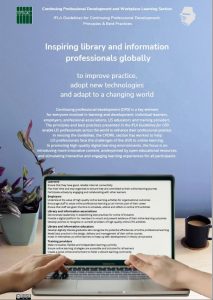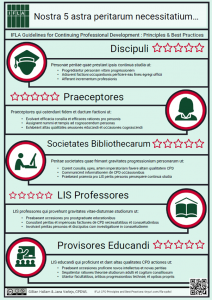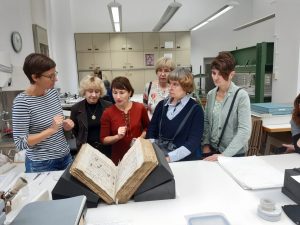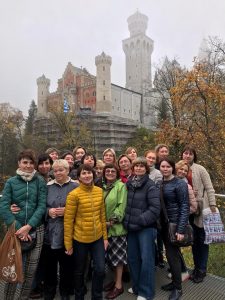At the WLIC 2022 held in Dublin, CPDWL launched a new poster about the IFLA Guidelines for Continuing Professional Development: Principles and Best Practices. When the Guidelines for CPD were released in 2016, the authors, Jana Varlejs, Vivian Lewis, Susan Schnuer and Juanita Jara de Sumar, highlighted the importance of considering additional quality concerns relating to professional learning and development activities delivered in the online environment. These concerns became a stark reality when the COVID pandemic arrived in 2020. Across the globe, face-to-face CPD events could not longer be held, so they were either cancelled or they moved online.
The CPDWL Standing Committee was already planning to review and adapt the Guidelines for CPD for digital learning contexts. A small working group was given the challenge of undertaking the requisite research to identify and collate relevant resources that discussed the principles and best practices of virtual learning in the context of CPD, focusing on quality assurance standards and the cultural and linguistic differences in different regions of the world. To date, over 100 resources have been reviewed.
As part of the online WLIC in August 2021, CPDWL hosted a panel discussion entitled NOW – NEW – NEXT: Seizing the opportunities to redefine and reimagine professional development through online learning. There were five speakers who represented the different stakeholder groups outlined in the Guidelines document: Dr Matilde Fontanin for the Learners, Dr Alan Brine for the Employers, Associate Professor Naoki Matsumoto for Professional Associations, Professor Sandy Hirsh for LIS Educators, and Tony Zanders for LIS Training Providers. The panel members were invited to share their views about the value of the Guidelines for CPD in today’s world, and their perspectives about good practice for CPD in an online world. The main outcome from the panel discussion was that the Standing Committee’s ideas about updating the Guidelines was affirmed – but it was indeed “a really big job”.
Although the working group is still drafting the supplementary materials for the revisions to the Guidelines, the WLIC in Dublin provided the opportunity to develop a poster to present the key ideas. The notion of a poster was already very popular: the original Guidelines poster has already been translated into 36 languages. Ivana Todorovic, one of the Standing Committee members who lives and works in Serbia, offered to be the creative mind to develop the poster, supported by Alan Brine and Gill Hallam It was an iterative process, but the final poster that was presented in Dublin by Alan Brine and other members of the Standing Committee, is eye catching, with an interesting, contemporary design and a clearly structured message.

The poster seeks to inspire library and information professionals globally to improve practice, adopt new technologies and adapt to a changing world. It is argued that CPD is a key element for the five stakeholder groups involved in learning and development. While the principles and best practices examined in the Guidelines remain valid, it is critical that LIS professionals promote high-quality digital learning environments by focusing on the introduction of more innovative content which is underpinned by open educational resources, and stimulating interactive and engaging learning experiences for all participants.
The principles for high quality online learning indicate that:
Learners should:
- Ensure that they have good, reliable Internet connectivity
- Plan their time and stay organised to ensure that they are committed to their online learning journey
- Participate actively by engaging and collaborating with other learners.
Employers should:
- Understand the value of high-quality learning activities for organisational outcomes
- Encourage staff to value online professional learning as an intrinsic part of their career
- Ensure that staff are given the time to schedule, attend and reflect on online CPD activities.
Library and information associations should:
- Demonstrate leadership in establishing best practices for online CPD events
- Provide a digital platform for members to record and present evidence of their online learning outcomes
- Develop policies to recognise or accredit providers of high-quality online CPD activities.
Library and information educators should:
- Develop digitally literate graduates who recognise the potential affordances of online professional learning
- Model best practice in the design, delivery and management of their online courses
- Invest themselves as online learners to keep up with developments in theory and practice.
Training providers should:
- Make innovative, flexible and independent learning a priority
- Ensure online learning strategies are accessible and inclusive for all learners
- Create a social online environment to foster a vibrant learning community.
The new poster is being added to CPDWL’s publications in the IFLA repository and a template will be available so that it can be translated into many other languages. Can we beat the 36 languages achieved with the first poster?
If you would like to translate the poster to ensure that CPD in the digital learning environment is acknowledged as a critical enabler for a strong, agile and resilient LIS profession, please contact Gill Hallam (gillian [dot] hallam1 [at] bigpond [dot] com).
We are looking forward to hearing from you!




